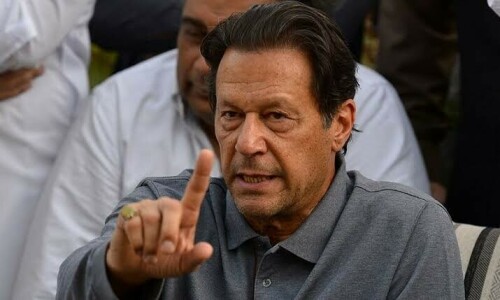ISLAMABAD, Jan 17: The government suffered another setback on Tuesday when the Supreme Court suspended the licence of Babar Awan to practise in the court.
The court also asked for replacement of Dr Awan with another counsel to represent President Asif Zardari in his reference relating to revisiting the murder trial of former prime minister Zulfikar Ali Bhutto.
An 11-judge larger bench hearing the presidential reference observed that it was indeed one of the most important cases in the judicial history, but decided to resume further hearing when the president nominated a new counsel.
Irritated by Babar Awan’s decision not to file a reply or engage a counsel to defend himself on contempt charges, the court ignored his request to engage the lawyer now even though he tried to convince the court that he had always respected it in the most charged circumstances.
“More than sufficient time has already been given. We have to proceed with the case, as early as possible, without delay in any manner, and unless the question of notice issued under Order 4 Rule 30 of the Supreme Court Rules, 1980, is decided it will not be appropriate to proceed with the reference,” the court observed.
Soon after the court’s order, Senator Awan went straight to the Presidency, triggering rumours that he was being given some important assignment.
The court asked its registrar to collect enrolment files of Dr Awan from the Pakistan Bar Council as well as from the Punjab Bar Council where he is enrolled as an advocate of the high court. The registrar has also been directed to get judicial files to ascertain the outcome of another contempt charge against Dr Awan by the Lahore High Court in the past when he was defending Benazir Bhutto and Asif Ali Zardari in corruption cases.
Attorney General Maulvi Anwarul Haq has been asked to inform the president about the suspension of Mr Awan’s licence to enable him to appoint another counsel.
Supreme Court Bar Association President Yasin Azad told reporters that his association would try to defuse the tension between the two institutions in the interest of the country.
“We will play our role in ending the crisis amicably,” Mr Azad said, hinting that although the court had the authority to suspend a licence, the matter might be referred to the Pakistan Bar Council, the ultimate arbiter in such matters.
PCB Vice-President Latif Afridi said that had Mr Awan submitted his reply in time, the situation would have not reached this point.
Irked by his remarks against the judiciary, the court had on Jan 5 issued a second show-cause notice to Mr Awan and asked him to explain why his licence to practise in the apex court should not be cancelled. Dr Awan is also facing a contempt charge for his media jibe against the judiciary. On Dec 1, immediately after the apex court issued an order in the memo case, the PPP leader criticised the decision at a press conference and made some remarks which were considered derogatory by the court.
“If the institution like the Supreme Court is not respected and an attempt is made to lower its prestige in the eyes of the general public, then it will be very difficult to administer justice because this is the court whose working/decisions send a message down to the court of the magistrate and the civil judge that they should administer justice without fear or favour.
And if the court is maligned by anyone, then it would not be possible (for it) to maintain its dignity and status,” the court said in its Tuesday’s order.
The order said that the utterances, gestures made and the body language of the counsel (Mr Awan) were indicative of an attempt to ridicule the court and that the counsel instead of denying admitted that he had uttered the words on the television which though he said reflected respect.
“We do not know those facts, but prima facie, we are of the view that the conduct of Mr Awan is unbecoming of an advocate of the Supreme Court and, therefore, we issue notice to him under Rule 30 of Order IV of the Supreme Court Rules, 1980, to explain as to why his name be not removed from the roll of advocates of this court,” the order said.













































